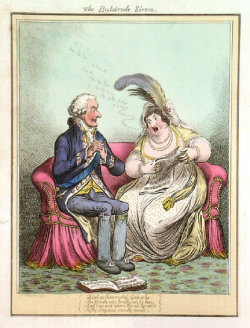|
In the eighteenth century young men of good family were sent to do the Grand Tour, beginning in Paris,
and wandering as far as the siren city of Naples â the second city in Europe - or even Palermo.
After a year of what was supposed to be a long educational trip, they would return to England loaded with
expensive rubbish that had been sold to them as genuine antiques.
Once titled or famous visitors arrived in Naples, they would present themselves to the British Ambassador
to the King of Naples, Sir William Hamilton. He was a member of the Royal Society, a collector of antiquities
and an ardent student of volcanoes, especially Vesuvius and Etna. His wife, Emma Hamilton, had had a dubious
past â and would later become the mistress of Admiral Nelson - but was now firmly established as an intimate
friend of the Queen of Naples.
The soprano Elisabeth Billington (nĂŠe Weichsel, 1768-1818) was one of the greatest singers of the eighteenth
century: she, Cecilia Davies, the tenor John Braham and the bass Michael Kelly were the only British singers
to conquer Italian opera houses in that period. In 1792 Mrs. Billington was singing in opera in London when a
certain James Ridgway published a pornographic âbiographyâ of her. Rude remarks were shouted from the gallery
at Mrs. Billingtonâs performances, and she felt obliged to leave England until the scandal had died down.
So Elizabeth, her brother the violinist Charles Weichsel and her husband Mr. Billington set off on the Grand Tour.
When they arrived in Naples in 1794 Sir William and Lady Hamilton were so enthusiastic about her singing that Emma
introduced her to the Queen. After hearing Mrs. Billington sing at the Palace of Caserta, the King and Queen insisted
that she should open the season at the San Carlo opera house (a building that is part of the royal palace).
She made her dĂŠbut on the 30th May 1794 in Francesco Bianchiâs Ines di Castro, and later appeared in operas by PaĂŤr,
Paisiello, Himmel and Guglielmi.
Two nasty accidents threatened her popularity during her first season in Naples. Vesuvius erupted, and the
superstitious Neapolitans thought that this was divine retribution because the King had allowed an English heretic
to sing on the sacred stage of the San Carlo; fortunately she sang so brilliantly that they forgot about the eruption.
In any case, she had the loyal support of the English colony in Naples, led by Lady Templeton, Lady Palmerston, Lady
Gertrude Villiers and Lady Grandison. More seriously, one evening in 1796, during her second season, as she and her
husband were preparing to go to the theatre, Mr. Billington suddenly dropped dead of a heart attack. Rumours soon
started to circulate that the diva had poisoned her husband, and Elizabeth and her brother thought it prudent to
retire to the theatres of Milan and Venice.
In 1799 the widow Billington married a handsome Frenchman, who beat her and took all her money; she ran away to
London with her brother and sang again in English as well as Italian opera. In 1806, for her benefit performance,
she chose Mozartâs La clemenza di Tito; it was the first time any opera of Mozartâs had been performed in England.
She borrowed the only full manuscript score in England from the Prince of Wales (an old admirer of hers) and when she
score arrived at the theatre, the orchestra, singers and chorus were so anxious to hear the music that Mrs. Billington
sat down at the piano and played and sang her way through the entire opera. Mrs. Billington retired in 1809 and in 1817
was reconciled to her husband, retiring with him to her estate near Venice. Here in 1818 he finally killed her by
throwing a heavy dish at her. The worldâs first victim of a âflying saucerâ?
Michael Aspinall

|
|
âThe Bulstrode Sirenâ, a caricature by James Gillray, engraved in 1803, showing the prima donna
Mrs Billington side by side with the Duke of Portland, William Henry Cavendish-Bentinck. The Duke
had invited her to his stately home, âBulstrodeâ, to sing for him, and she was paid handsomely. (British Museum)
|
|
|
|
|

Michael Aspinall
|
|